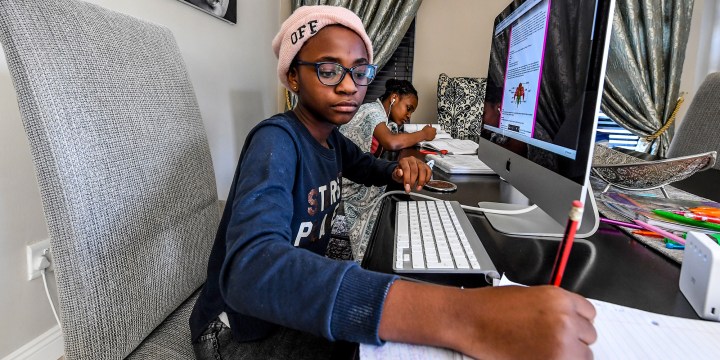Daily Maverick 168
Can WhatsApp save the SA schooling system?

Digital teaching methods born out of necessity during the Covid-19 lockdown present opportunities for long-term boosts to the education system.
First published in Daily Maverick 168
In October 2005 an earthquake measuring 7.6 on the Richter scale struck northern Pakistan. Its effects were devastating: more than 80,000 people dead and millions more left homeless.
Other aspects of the earthquake’s impact were less visible and more long term. As a result of the damage, children in the affected region missed three months of school. Four years after the earthquake, they were still lagging a year and a half behind their peers in terms of educational progress.
This is frightening, given the obvious parallels with the Covid-19 lockdown, which has meant that regular schooling has been suspended in South Africa for five months and counting.
“Our kids are in serious trouble, no matter which way you spin it,” teacher and activist Joanna Reynolds told me. She was referring to the effects of the extended educational disruption. If ever there was an education system that didn’t need more problems, it was South Africa’s – but we can now add the impact of lockdown to the existing challenges.
Yet a silver lining might be found in innovations birthed by the crisis, with teachers, NGOs and businesses having scrambled their resources to keep South Africa’s school kids learning from afar.
From WhatsApp tutorials to video classes, all sorts of remote teaching techniques have been developed and fast-tracked since the outbreak of the pandemic. We spoke to an NGO working in the rural Eastern Cape heartland, Axium Education, which has made WhatsApp the nucleus of its lockdown teaching. “You set the class time; the class is going to start at 4pm,” Axium’s Reynolds explained.
“A teacher logs on and says: ‘Hi everyone, please raise your hand or send a little emoji if you’re present.’ All the kids who are present online send their emojis. The teacher greets the class and starts presenting the lesson.” What follows is an entire class taught over WhatsApp, with the teacher using it to send learners documents, voice notes, images and more. Reynolds says the method has been successful – and in fact has advantages over conventional classroom teaching.
One is that children can be grouped according to their educational needs rather than their age: a multilevel approach that Reynolds describes as extremely helpful when dealing with the reality that some learners reach high school and are “five, six, seven years behind in maths and three years behind in reading”.
Another is that teachers can check in with pupils privately to see how they are coping with the material – something often difficult to achieve in overcrowded classrooms where children may also be unwilling to publicly admit they are struggling. But possibly the greatest opportunity offered by WhatsApp as an educational tool is its growing use to link up school kids with teachers in different cities or even continents.
Wits University’s Dr Lynn Bowie pointed out that it is often very hard to get quality tutors to where they are most needed in South Africa’s rural areas. If tutors are able to offer help to school kids from afar via WhatsApp it’s not hard to imagine that many more might volunteer their services.
The obvious caveat here is that digital infrastructure lags and data costs are high — problems that need solving before South Africa’s education system can stride boldly into the Fourth Industrial Revolution.
Yet the challenges should not be overstated. For instance, NGOs that have succeeded in keeping kids learning during this time have generally had to subsidise the distribution of entry-level smartphones and accompanying data. But these phones are not expensive: Bowie noted that the organisation she works with, Olico Maths Education, has had success with basic handsets available for about R500.
Reynolds said, through trial and error, they learnt that data supplied to learners should be WhatsApp data, which can be used only on that messaging system and goes a lot further.
South Africa’s telecommunications networks also zero-rated educational websites during lockdown, meaning that the sites can be accessed without data – a gesture that activists have suggested should be widened and permanently extended. The NGOs and businesses we spoke to said that digital education techniques had been in the works in South Africa for a number of years, but the Covid-19 lockdown had dramatically accelerated their introduction.
And, by the sound of it, the crisis has forced the emergence of new ways of doing things in education that may offer solutions in the long run and help bolster South Africa’s ailing school system. Both Reynolds and Bowie said their organisations would be retaining WhatsApp as a tutoring tool; Olico is also launching a WhatsApp hotline to which any learner can send maths queries.
One thing is clear: when “normal life” resumes post-Covid-19, the education system will already be working to ensure that the learners affected by disrupted schooling in 2020 are not left behind for years. Digital methods should be taken seriously as offering a valuable supplement to in-person teaching. South Africa’s education system needs all the help it can get. DM168



















 Become an Insider
Become an Insider
Comments - Please login in order to comment.